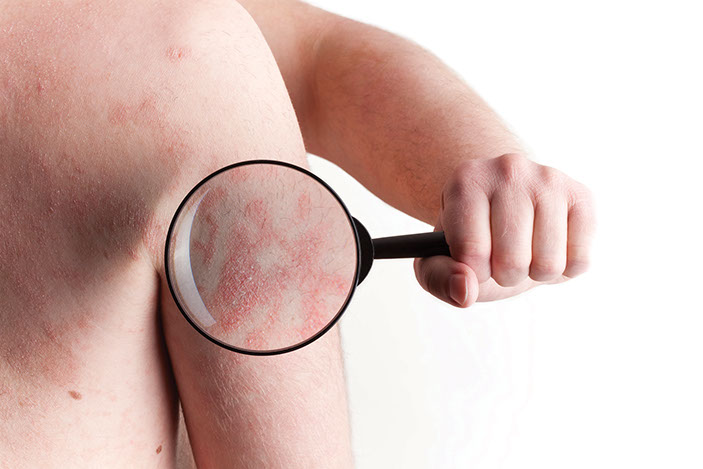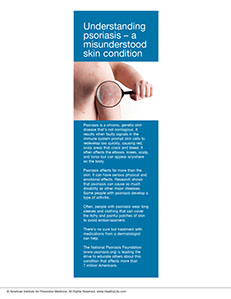SYMPTOM CHECKER
CONDITIONS
Male
Female
Child
Arm, Hand & Shoulder Concerns
Legs & Feet Concerns
Dental & Mouth Concerns
Ear & Nose
Eye Conditions
Head Conditions
Arm, Hand & Shoulder Concerns
Legs & Feet Concerns
Front
Back
Arm, Hand & Shoulder Concerns
Dental & Mouth Concerns
Ear & Nose
Eye Conditions
Head Conditions
Arm, Hand & Shoulder Concerns
Dental & Mouth Concerns
Ear & Nose
Eye Conditions
Head Conditions
Front
Back
Arm, Hand & Shoulder Concerns
Neck Links
Head & Neck Concerns
Arm, Hand & Shoulder Concerns
Neck Links
Head & Neck Concerns
Front
Back
Online Clinic
Wise Healthcare
Understanding psoriasis – a misunderstood skin condition
Print on Demand
Psoriasis is a chronic, genetic skin disease that’s not contagious. It results when faulty signals in the immune system prompt skin cells to redevelop too quickly, causing red, scaly areas that crack and bleed. It often affects the elbows, knees, scalp, and torso but can appear anywhere on the body.
Psoriasis affects far more than the skin. It can have serious physical and emotional effects. Research shows that psoriasis can cause as much disability as other major diseases. Some people with psoriasis develop a type of arthritis.
Often, people with psoriasis wear long sleeves and clothing that can cover the itchy and painful patches of skin to avoid embarrassment.
There’s no cure but treatment with medications from a dermatologist can help.
The National Psoriasis Foundation (www.psoriasis.org) is leading the drive to educate others about this condition that affects more than 7 million Americans.
This website is not meant to substitute for expert medical advice or treatment. Follow your doctor’s or health care provider’s advice if it differs from what is given in this guide.
The American Institute for Preventive Medicine (AIPM) is not responsible for the availability or content of external sites, nor does AIPM endorse them. Also, it is the responsibility of the user to examine the copyright and licensing restrictions of external pages and to secure all necessary permission.
The content on this website is proprietary. You may not modify, copy, reproduce, republish, upload, post, transmit, or distribute, in any manner, the material on the website without the written permission of AIPM.
2021 © American Institute for Preventive Medicine - All Rights Reserved. Disclaimer | www.HealthyLife.com
















































